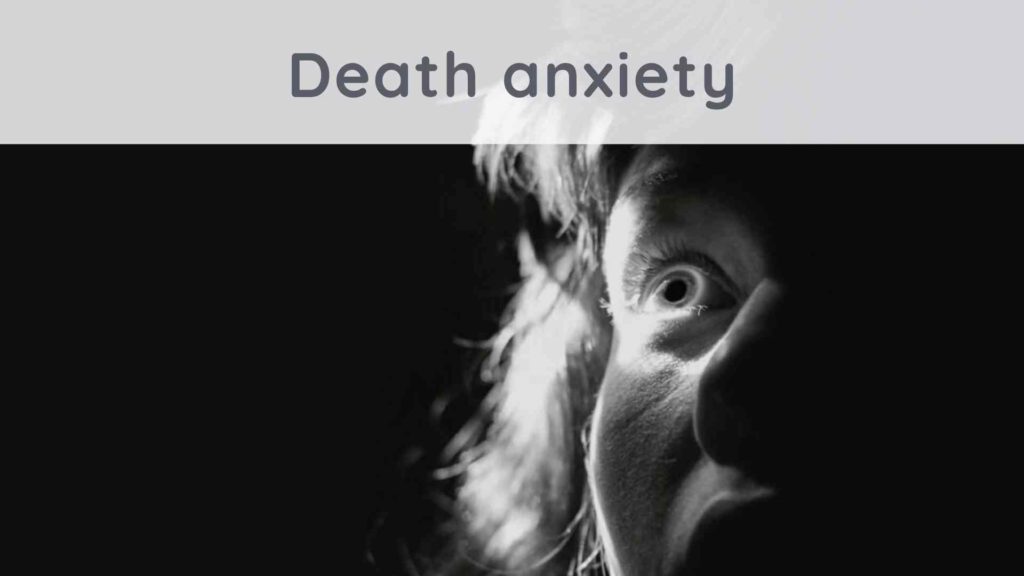Death anxiety : how can we not be afraid to die?
Written by: Loris Vitry (holistic coach)
Validated by: Cathy Maillot (Osteopath)
Caution: If you have any medical questions or concerns, please speak to your doctor. Even if the articles on this site are based on scientific studies, they do not replace professional medical advice, diagnosis or treatment.

No one can escape death!
Even though many know the whole truth behind this statement, there is great angst resentment over the idea of dying.
This anxiety is so high and present that it becomes a great source of daily stress for some people.
If you are one of those people who are always afraid of dying, this article gives you the secrets to no longer being afraid of dying.
Realize that your fear of death becomes inhibiting
The anguish felt at the thought of dying or seeing loved ones dying is a human feeling in almost every individual.
However, when we talk about thanatophobia, this feeling becomes paralyzing.
An alteration of the vital state in the person is therefore noted, which harms his well-being and prevents him from continuing his life plans normally or living in harmony with the people around him.
This state of anxiety considerably impacts the daily life of those who feel it, and those who live with them.
The first step in healing is, therefore, to realize that you have thanatophobia and to look for the cause.
High anxiety linked to death is indeed always caused by a traumatic event.
In most cases, the death of a loved one, but other circumstances, such as seeing a corpse, can lead to this emotional state.
In rare cases, thanatophobia can be explained genetically.
Talking about death to better accept it
While it’s perfectly normal to avoid certain dangerous situations, feeling the danger everywhere and at any time becomes problematic.
To no longer be afraid of dying, you must first accept it.
By realizing that it is not avoidable, the best thing is to get rid of the terrifying thought that is associated with death.
Psychotherapists have helped paralyzed individuals to accept the anguish of dying or seeing a loved one dies thanks to therapy sessions.
Speaking out allows people in distress to free themselves.
They are more able to overcome grief or phobia to regain their momentum.
An existential therapy to overcome his fear of death
Existential therapy, highlighted in an essay by Irvin Yalom, consists of questioning the meaning of one’s own life and the elements that make it complete.
It is during an analytical therapy that the professional pushes his patients to a work of introspection.
The individual anxious about death will have to imagine himself in an uncomfortable situation seeing his funeral.
The idea here is to push yourself to ask questions about what people will remember about you after death.
An essential aspect of existential therapy is to redefine life plans during the time left to live.
Interpersonal relationships and the principles of the person are also central to his reasoning.
“What should I care about in my life? “; “Am I well surrounded? “, etc.
The answers to these questions can lead to a sudden awareness, which leads to a positive change in one’s lifestyle and help to live freely before the arrival of death.
Participating in cognitive and behavioral therapy
To help their patients get rid of the fear of death, some psychologists offer to participate in a group discussion.
Cognitive and behavioral therapies can also demystify a subject as taboo as death by changing factors that lead to fear of death, such as negative emotions, specific behaviors, or misbeliefs.
Its goal is to make the individual accept death as an integral step in life.
It is through acceptance and gaining consciousness of this anguish of death that the fear of death will gradually diminish.
During specific treatments, people who have thanatophobia are also exposed to anxiety situations that are often difficult to live with.
Speaking out about a painful death or talking about a morbid event that triggered the trauma is a step toward recovery.
It is an approach that allows us to question certain beliefs that are linked to the fear of dying.
In short, instead of repressing this torment, this approach favors talking about it.
Speak to a professional to overcome his fear of death
When it becomes stressful, the anxiety about your death or loved ones requires the accompaniment of a professional.
It is possible to call on different specialists in this case.
A psychiatrist
Thanks to his specialization, this professional is the only one able to prescribe medication to people with thanatophobia.
Consulting a psychiatrist also involves analytical therapy.
Exchange and speaking are essential to be able to face this fear.
Note that the analytical therapy sessions conducted by psychiatrists are generally part of the care covered by health insurance.
A psychologist
This professional makes speech therapy the primary means of treating individual traumas.
The phobia of death is also one of the cases treated by psychologists.
Sometimes consultation sessions that take place in hospitals or educational, social organizations are reimbursed by health insurance.
A psychotherapist
If the public authorities recognize the first two professions, this is not the case for psychotherapy.
A psychotherapist is a term for all therapists who are not officially recognized.
Among these professionals, some nevertheless have qualifying degrees.
It is best to inform yourself before choosing a psychotherapist for proper care.
When someone has the feeling of living as he wishes, he becomes capable of accepting death and live in peace before dying one day.
Talking about the guilty or frightening circumstances that triggered the fear of death is also an essential step in coping with this phobia and being able to overcome it.
Continue reading:
Aerophagia: how to relieve yourself naturally?

